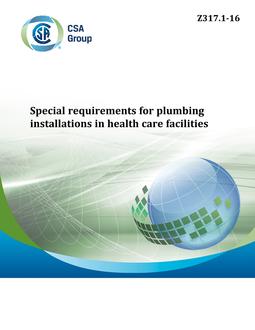Preface
This is the fifth edition of CSA Z317.1, Special requirements for plumbing installations in health care facilities, one of a series of Standards related to health care facility engineering. It supersedes the previous editions, published in 2009, 1999, 1988, and 1978. This Standard is intended to assist health care facilities to manage the potential risks associated with plumbing installation and maintenance. The following have been updated for this edition: a) scope and definitions (Clauses 1 and 3); b) requirements and recommendations on infection prevention and control (Clause 4); c) requirements on system design, initial system treatment, and ongoing measures to limit the occurrence of legionella and other infectious micro-organisms (Clause 6); d) requirements on plumbing fixtures and fittings, including hand hygiene sinks (Clause 8); and e) a new clause on catastrophic event management (Clause 9). CSA Group acknowledges that the development of this Standard was made possible, in part, by the financial support of the governments of Alberta, British Columbia, Manitoba, New Brunswick, Newfoundland and Labrador, Northwest Territories, Nova Scotia, Nunavut, Ontario, Prince Edward Island, Quebec, Saskatchewan, and Yukon, as administered by CADTH.
Scope
1.1 This Standard addresses the special requirements of plumbing systems pertinent to the design, construction, operation, and maintenance of health care facilities (HCFs). This Standard specifies requirements for the following in HCFs: a) water supply systems, including domestic cold water systems and hot water systems; b) plumbing fixtures and fittings; c) drainage systems; d) monitoring and maintenance of water systems; e) infection control; f) catastrophic event planning; g) specialized water systems (e.g., reverse-osmosis, deionized, distilled); and h) hydraulic fire protection systems. Note: Special requirements for plumbing systems apply in HCFs because of the need to protect occupants of the facility and the adjacent surroundings from a) infectious diseases; b) hazards created by improper temperatures, leaks, and inadequate drainage; and c) adverse conditions created by the failure or improper operation of plumbing systems. 1.2 This Standard supplements the relevant standards and other applicable requirements for plumbing systems, fixtures, and fittings in general building applications. Notes: 1) Relevant plumbing standards for plumbing systems, fixtures, and fittings in general building applications include
- a) ASME A112.19.2/CSA B45.1; b) ASME A112.19.1/CSA B45.2; c) ASME A112.19.3/CSA B45.4; d) CSA B45.5/IAPMO Z124; e) CAN/CSA-B64 Series; f) ASME A112.18.1/CSA-B125.1; g) ASME A112.18.2/CSA-B125.2; and h) CSA B125.3.
2) Applicable requirements for plumbing systems are also contained in the National Building Code of Canada and the National Plumbing Code of Canada. 1.3 This Standard does not apply to medical gas systems. Note: See CAN/CSA-Z7396.1 for design, installation, certification, and maintenance requirements for nonflammable medical gas piping systems. 1.4 This Standard is not intended to preclude the use of design concepts and the adoption of construction, installation, operations, and maintenance procedures more stringent than those specified in this Standard and in the documents listed in Clause 1.2. 1.5 This Standard applies to all classes of HCF. Note: Some requirements may be waived for smaller Class C-2 HCFs as determined by the application of engineering principles and in consultation with the administrator and the authority having jurisdiction. 1.6 The requirements of this Standard apply to the retrofitting of existing systems when a) an existing HCF is
- i) extended; or ii) undergoing material alteration or repair; and
b) the plumbing in existing facilities is adversely affected. 1.7 In this Standard, “shall” is used to express a requirement, i.e., a provision that the user is obliged to satisfy in order to comply with the Standard; “should” is used to express a recommendation or that which is advised but not required; and “may” is used to express an option or that which is permissible within the limits of the Standard. Notes accompanying clauses do not include requirements or alternative requirements; the purpose of a note accompanying a clause is to separate from the text explanatory or informative material. Notes to tables and figures are considered part of the table or figure and may be written as requirements. Annexes are designated normative (mandatory) or informative (non-mandatory) to define their application. 1.8 The values given in SI units are the units of record for the purposes of this Standard. The values given in parentheses are for information and comparison only.
Product Details
- Edition:
- 5th
- Published:
- 10/01/2016
- ISBN(s):
- 9781488303869
- Number of Pages:
- 77
- File Size:
- 1 file , 1.6 MB
- Redline File Size:
- 2 files , 7 MB
- Product Code(s):
- 2424529, 2424974, 2424529, 2424529
